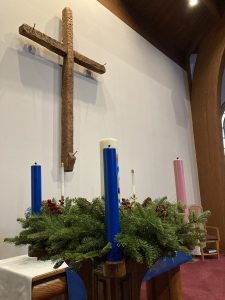A Physical Presence in Our Lives
Written by |

On Saturday morning, I lay cuddled next to my husband, Todd, in bed. I could feel his thigh muscles pulse against my leg, misfire after misfire. I wished I could will the fasciculations to stop. When I washed him and changed his shorts, I was struck by how thin his once-muscular legs have become.
I’m saddened to see what this disease has done to his body.
After I put him in his wheelchair, Todd said, “Give me a hug.”
I wrapped my arms around him and leaned my head against his.
“Thank you,” he said. “I love you, Buttercup.”
My mom took the kids that evening, and for our date night, I grilled steaks, fried potatoes with onions, and made a salad. I sat next to Todd and fed him bites of salad. He ate the pieces of steak and potato himself, eating face-to-plate from his counter-height folding table.
Then, Todd and I watched “Rising Phoenix,” a documentary about the Paralympics.
I was amazed by these athletes who learned to persevere and adapt to physical disabilities. One woman swam competitively with one leg. Another fenced from a wheelchair with amputated hands and legs, her jousting stick strapped to her arm. A man ran with Flex-Foot Cheetah prosthetics, his legs amputated at the thighs.
Popular thought about the body has taken different twists and turns over time and in different cultures. The ancient Gnostics thought the body was evil or just an illusion, and Renaissance artists celebrated the human body as they delved into an accurate understanding of anatomy. There has only recently been much progress made in changing perceptions of people with disabilities.
The Paralympic games were started to overcome negative stereotypes, showing that people with disabilities can be highly functioning, contributing members of our society. In some ways, it’s more inspiring to watch these athletes perform than the Olympians.
A quote from director Ian Bonhôte introduces the film: “The Olympics is where heroes are created. The Paralympics is where the heroes come.”
There is so much that humans can overcome, but how do we adapt when an entire body keeps wasting away with a disease like ALS?
Human bodies are sometimes strong and beautiful, and sometimes strength and beauty are found in a person’s will to keep going.
With ALS, life becomes increasingly cerebral, and yet there is still a physical presence. Todd has a body that must be cleaned and fed by someone else, but his body still provides comfort as he is here with our children and me.
We are so frail, and in our fragility we enter the Advent season, during which Christians everywhere reflect on the coming of God in a human body. A body that would grow and jump and run and play — and ultimately a body that would be broken.

An Advent wreath I made. (Photo by Kristin Neva)
***
Note: ALS News Today is strictly a news and information website about the disease. It does not provide medical advice, diagnosis, or treatment. This content is not intended to be a substitute for professional medical advice, diagnosis, or treatment. Always seek the advice of your physician or other qualified health provider with any questions you may have regarding a medical condition. Never disregard professional medical advice or delay in seeking it because of something you have read on this website. The opinions expressed in this column are not those of ALS News Today or its parent company, Bionews, and are intended to spark discussion about issues pertaining to ALS.






Mary Kay Nichols
I feel those same feelings watching my husband lose his muscle mass and the constant fasciculations in his arms and legs. His brain is still as brilliant as ever. I pray for a miracle.
He was diagnosed in April 2019,a genetic mutation inherited from his mother. She had no idea it was genetic.
I have hope that there will someday soon be a cure or at least a drug to stop the destruction of neurons for this disease that sneaks in on you and literally takes the life out of your body little by little.
Meanwhile, we do what we can and make the best of the situation.
Each day is a true blessing for each of us.